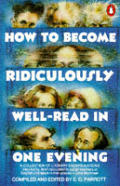 Back in high school, I had a book called How to Become Ridiculously Well-Read in One Evening, which described itself as “A Collection of Literary Encapsulations” and contained classic works of literature in short, usually silly poems. For example, The Great Gatsby began thusly:
Back in high school, I had a book called How to Become Ridiculously Well-Read in One Evening, which described itself as “A Collection of Literary Encapsulations” and contained classic works of literature in short, usually silly poems. For example, The Great Gatsby began thusly:
Nick Carraway and Gatsby (Jay)
Are next-door neighbors; every day
The enigmatic Gatsby gazes
Towards a distant green light (Daisy’s).
Cute, right? But it seems some people took the book at face value, expecting to catch up on the Western canon in just a few hours. Says one review of the book on Goodreads:
I had to give up on this one. It’s meant to be brief synopses of classics, so you supposedly don’t have to read the books yourself, but they really only make sense if you’ve already read the books.
She’s right about that–like most parodies, the poems are much funnier if you know the originals–but she’s also not alone. Since time immemorial, people have been trying to figure out how to “read” books without, you know, actually reading them.
Recently, a new startup called Wibbitz claims it can convert any text to video. Explains Social Times:
With Wibbitz you’ll never have to read again—you can surf over to any webpage, click the play button and be served up with a 60-second video summarizing everything you need to know about what’s on that page.
In an interview with Beet.TV, Wibbitz CEO and Co-Founder Zohar Dayan says, “Basically, we analyze the text, we create a summary out of it, we only extract the most important parts of it, we analyze it and bring the most relevant images and video clips from around the web and convert all the text to voice. So basically what we come up with is a cool, interactive video that you can just lean back, hit play and watch.”
You can see a demo of Wibbitz in action here. I’d love to see how this tool would do with a passage from a novel–I can only imagine, say, an Alice Munro story summarized into its “most important parts” and illustrated with “the most relevant images and video clips.” (The New Yorker’s “abstracts” of its fiction are almost uniformly hilarious already. Don’t believe me? Read this one, of Lorrie Moore’s “You’re Ugly, Too,” and tell me I’m wrong.)
 Anyway, some in the publishing industry are alreay concerned about Wibbitz’s effect on literature. GalleyCat muses,
Anyway, some in the publishing industry are alreay concerned about Wibbitz’s effect on literature. GalleyCat muses,
It may take a few years, but this technology has some scary implication for readers and writers. Will unprofitable activities like reading and writing ultimately be threatened by the Internet?
Maybe I should get all up in arms about this, but mostly, these “summaries” of literature are just… funny. Take the Book-A-Minute website, which condenses books into rather cynical works that will take you far less than a minute to read. (Via.) Here’s their version of Gatsby:
Gatsby: “Daisy, I made all this money for you, because I love you.”
Daisy: “I cannot reciprocate, because I represent the American Dream.”
Gatsby: “Now I must die, because I also represent the American Dream.”
(Gatsby DIES)
Nick: I hate New Yorkers.
THE END
And here’s “The Rime of the Ancient Mariner“–technically not a book, but we’ll let it slide, because it lets us have this:
Ancient Mariner: I am creepy and old. Listen to me.
Wedding Guest: I’m late, but I’ll listen.
Ancient Mariner: I killed an albatross. Then everyone died.
THE END
Though it purports to be serious–“We’ve taken all kinds of great works of literature and boiled them down to their essence, extracting all the filler (and believe me, there’s a lot of it sometimes). In just one minute, you can read entire books and learn everything your teachers will expect you to know.”–Book-a-Minute is clearly intended as humor.
 In fact, it’s hard for me to imagine summaries of literature that wouldn’t be funny, intentionally or not. After all, one of the main features of good literature is that how it says things is just as important–perhaps even more important–than what it says. The text and the meaning can’t be separated from each other. In other words, condensed will never be as good as the real thing.
In fact, it’s hard for me to imagine summaries of literature that wouldn’t be funny, intentionally or not. After all, one of the main features of good literature is that how it says things is just as important–perhaps even more important–than what it says. The text and the meaning can’t be separated from each other. In other words, condensed will never be as good as the real thing.
But maybe I”m missing something. What do you think? Do summaries like those by Wibbitz pose a threat to writing, reading, and publishing?





